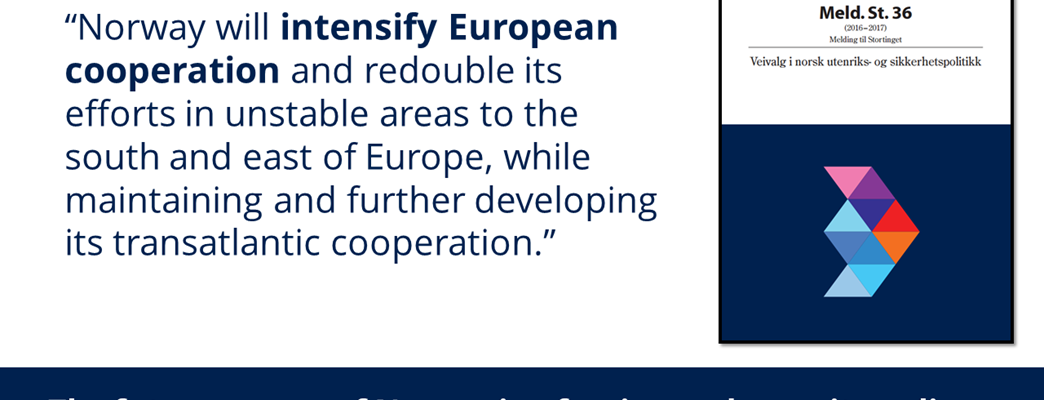The Government has presented a white paper to the Storting on the future course of security policy, which sets out how Norway can best prepare to meet the challenges ahead. The white paper was approved by the King in Council on 21 April.
A longstanding security policy
The white paper sets out that Norway should strengthen its existing security policy tools through close transatlantic cooperation, a consistent and predictable policy towards Russia, and a strong engagement to safeguard the international legal order.
NATO and the US security guarantee will remain the cornerstone of Norway’s security policy. Norway will continue to contribute to NATO reform, with a view to ensuring that the Alliance’s collective defence capability is sufficient for dealing with both existing and new challenges.
It is crucial to have a strong Norwegian defence. Together, the long-term defence plan, the white paper on global security challenges, the white paper on civil protection, and the white paper on the future course of security policy future form the Government’s overall strategy for addressing the security challenges Norway is facing.
It is in Norway’s interests to maintain a consistent and predictable policy towards Russia. Our proximity to Russia in the north means that we have considerable common interests.
Changes in the security landscape highlight how important it is to maintain and further develop international institutions that promote cooperation. Norway will shoulder its share of the responsibility in this context, for example by seeking the chairmanship of the OSCE in 2020 and membership of the UN Security Council for the period 2021-2022.
Respect for international law and the rule of law are fundamental to security and freedom in Norway, the rest of Europe, and the world as a whole. It will always be in Norway’s interests to support a predictable and rule-based international order.
Adjusting our course
At the same time, the current security situation means that Norway needs to adjust its course in some respects. A key conclusion of the white paper is that Norway needs to develop closer security policy cooperation with European allies and the other Nordic countries.
It is in Norway’s interests to cooperate closely with the EU and other European countries in a number of areas, including civilian and military crisis management, external border control, police and intelligence activities, and efforts to combat radicalisation and promote integration.
Europe will not be stable and secure unless the whole continent experiences peaceful, positive development. This is why the Government wants Norway to provide substantial support to the countries of the Western Balkans and eastern parts of Europe, to promote reforms, economic development and closer European cooperation.
To the south of Europe, war, conflict and weak governance are security challenges that are increasingly affecting Norway. The Government intends to invest in Norwegian and European security by stepping up Norway’s efforts in fragile states and regions near Europe’s southern external border.
The Government will launch a strategy for increased Norwegian engagement in fragile states and regions in the Middle East, North Africa and the Sahel. As far as possible, Norway will coordinate its efforts with the EU and the UN. We will take a coherent approach, coordinating efforts in the areas of humanitarian aid, long-term development, business development, and peace and reconciliation, various forms of capacity building, and military contributions.
Background
In 2015, the Government initiated a project to review of the whole breadth of Norway’s security policy and determine its future course. Over the last 18 months, the project has provided opportunities for a broad public debate on the main lines of Norwegian security policy, and has gathered input from Norwegian and international experts. This work has culminated in the white paper on the future course of Norwegian security policy, which aims to update Norwegian policy in the light of the more serious and unpredictable security situation we have today.
The changes in the security policy landscape are mainly due to developments in and around Europe. Russia’s annexation of Crimea in spring 2014 and the destabilisation of eastern Ukraine have made NATO renew its focus on collective defence, and have highlighted the importance of the EU as a security policy actor. At the same time, a belt of instability and weak states has developed along Europe’s external border to the south. This has provided a breeding ground for violent extremism both in the region and in Europe. In addition, millions of people have been driven from their homes in search of a better life.
A lack of solidarity and cooperation between European countries has at times undermined Europe’s collective ability to address the challenges it faces. At the global level, a new balance of power could weaken support for international norms and universal human rights. The ability and willingness of states to achieve their goals through conventional military force, covert operations and cooperation with non-state actors has increased. Isolationism and protectionism are on the rise in several countries, and may make binding international cooperation and trade difficult.
Against this backdrop, the new white paper sets out the Government’s intention to increase its focus on European and Nordic cooperation and intensify its efforts in the unstable region to the south of Europe. At the same time, longstanding elements of Norway’s foreign and security stand firm: maintaining a strong NATO, close transatlantic cooperation, a proactive Arctic policy, and a strong engagement in the efforts to safeguard an international legal order, through support for international law, the UN and other international institutions.
The new white paper is a supplement to the Government’s white paper on global security challenges, the long-term defence plan and the white paper on civil protection.

The future course of Norwegian security policy
The Government will continue the main lines of Norwegian security policy, strengthen cooperation with Europe, and intensify Norway’s efforts in Europe’s southern neighbourhood.